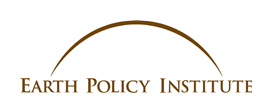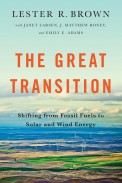Tuesday, April 28, 2015
Our latest and last book, The Great Transition: Shifting from Fossil Fuels to Solar and Wind Energy, has been released to great reviews and a great splash reception.
This lucid overview of world energy is surprisingly devoid of gloom.
—Nature
Amid all the doom, gloom, and denial, here comes a book that promises some good news regarding viable energy resources in the age of climate change. … By carefully analyzing policies and practices already in place around the world, Brown and his team of researchers demonstrate that new energy sources will be commonplace sooner than we think.
—Booklist
“The Great Transition” reads like a brief, breezy synopsis, … but its selected observations, arguments and conclusions are based in large part on years of observational data and deep research. It holds kernels of what the best and most optimistic future might look like if we pay attention and act in sensible ways with the tools and resources now available.
—Daniel Coffey, San Diego Source
The book reception was held at the Carnegie Endowment for International Peace on Friday, April 24, 2015.
Along with the great eats and drinks were brief comments on the book by three of the authors: Lester Brown, Janet Larsen, and J. Matthew Roney.
Our thanks to Cynthia Wagner who became our unofficial photographer!
Copies of the book can be purchased at EPI’s website through June 30, 2015.
Check out our events page to see where Lester, Janet, and Matt will be speaking about the Great Transition.
Cheers!
Reah Janise Kauffman
Wednesday, February 25, 2015
The Earth Policy Institute’s 11th and final book, will be hitting bookstores on April 20.
The Great Transition, written by EPI’s research team—Lester R. Brown, Janet Larsen, J. Matthew Roney, and Emily E. Adams—focuses on a rapidly evolving global movement toward cleaner sources of energy, driven by policy, economics, and the hard realities of accelerating climate change.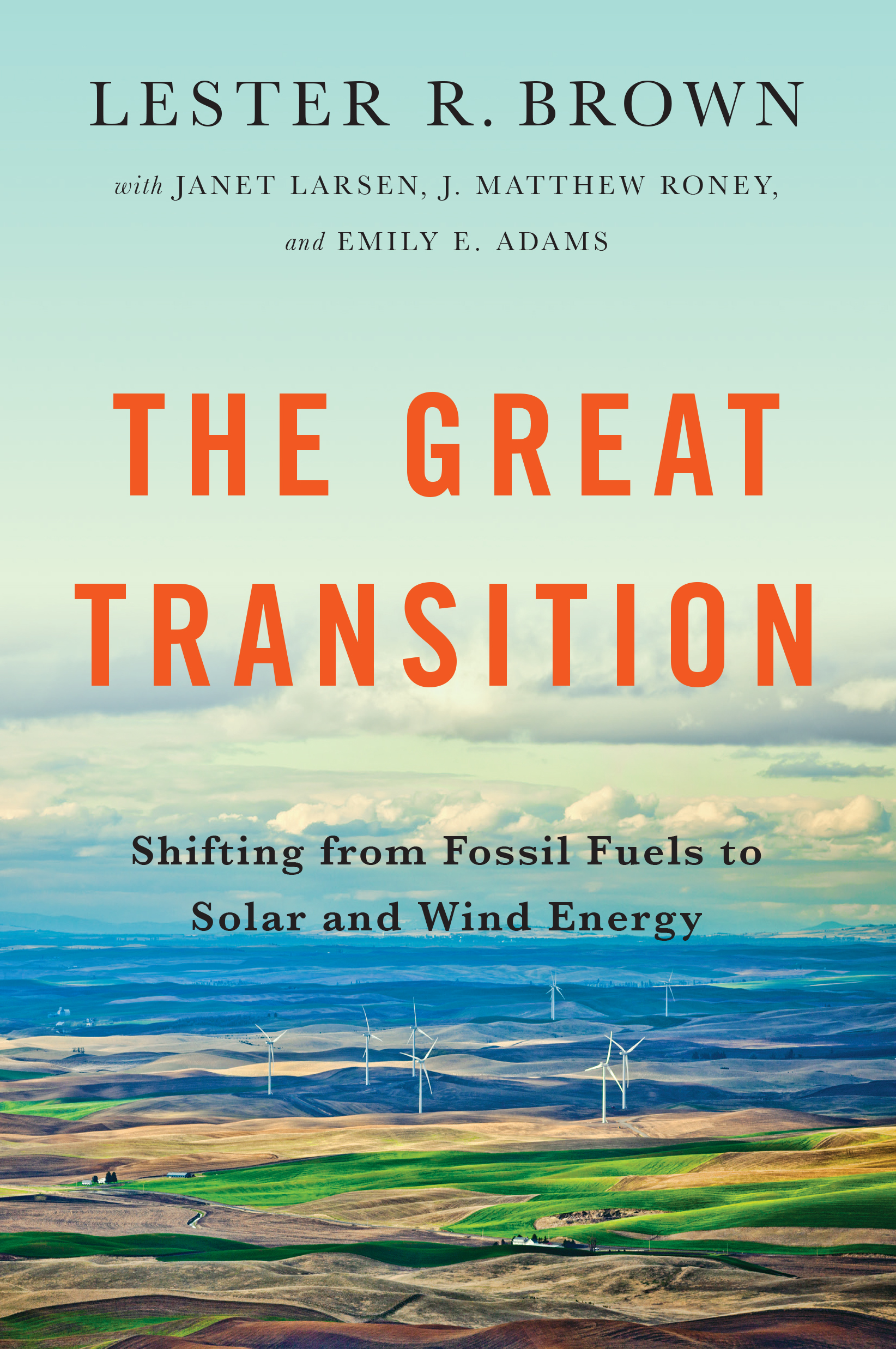
The authors note that as fossil fuel reserves shrink, as air pollution worsens, and as concerns about climate instability cast a shadow over the future of coal, oil, and natural gas, a new world energy economy is emerging. The old economy, fueled largely by coal and oil, is being replaced with one powered by solar and wind energy.
We can see the transition unfolding. For example, in the U.S. Midwest, Iowa and South Dakota are generating 26 percent of their electricity from wind farms. Denmark generates 34 percent of its electricity from wind. Portugal and Spain are above 20 percent. In China, electricity from wind farms now exceeds that from nuclear power plants. And in Australia, 15 percent of homes draw energy from the sun. With solar and wind costs falling fast, their spread is accelerating.
In The Great Transition, Brown and his colleagues explain the environmental and economic wisdom of moving to solar and wind energy and shows how fast change is coming.
“The energy transition will change not only how we view the world but also how we view ourselves,” say the authors. “With rooftop solar panels to both power homes and recharge car batteries, there will be a personal degree of energy independence not known for generations.”
Interested in a sneak peek? Check out Chapter 1. Changing Direction, on our website.
Pre-order a copy with us today for only $15 and get your copy as soon as it comes off the press.
For an additional $5 you can receive Lester Brown's memoir, Breaking New Ground, along with The Great Transition…we’ll even make sure Lester autographs it for you! Order here.
Best,
Julianne
Tuesday, January 20, 2015
After half a century of working on global environmental issues, Lester Brown, who pioneered the concept of sustainable development and of looking at global issues through an interdisciplinary lens, is retiring.
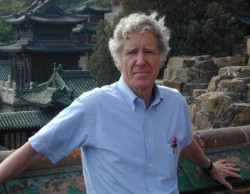 “After careful consideration of my life at 80 years,” said Brown, “and with profound appreciation to my staff, collaborators and supporters, I have decided to step down as president of the Earth Policy Institute and end its work as of July 1, 2015.”
“After careful consideration of my life at 80 years,” said Brown, “and with profound appreciation to my staff, collaborators and supporters, I have decided to step down as president of the Earth Policy Institute and end its work as of July 1, 2015.”
Brown continued, “I believe the Earth Policy Institute has accomplished what we set out to do when we began in 2001, and now it is time for me to make a shift and no longer carry the responsibility of managing an organization. I plan to continue to research and write on issues that I believe I can add to in some meaningful w ay.”
ay.”
Until the end of June, the Institute will continue to publish articles and will also be releasing its fourteenth book. The Great Transition: Shifting from Fossil Fuels to Solar and Wind Energy will be released around April 20, 2015.
Written by Brown and his colleagues, Janet Larsen, Matt Roney, and Emily Adams, the book details the rapid emergence of a new world energy economy. The old economy, fueled largely by coal and oil, is being replaced with one powered by solar and wind energy.
The transition is quietly unfolding. For instance, in the U.S. Midwest, Iowa and South Dakota are generating at least 26 percent of their electricity from wind farms. Denmark generates 34 percent of its electricity from wind. Portugal and Spain are above 20 percent. In China, electricity from wind farms now exceeds that from nuclear power plants. And in Australia, 15 percent of homes draw energy from the sun. With solar and wind costs falling fast, their spread is accelerating.
Sincerely,
Reah Janise Kauffman
Wednesday, December 17, 2014
The 80th birthday celebration for Lester Brown continues!
So many people. So many stories. Lester has always been acutely tuned to the need to work with the media, because while an author can publish research books, the media is essential in getting the word out. Two media people share today, along with two former colleagues from Worldwatch Institute, which he founded in 1974 and headed for 26 years.
Steve Curwood is Executive Producer and host of Living on Earth. Steve created the first pilot of Living on Earth in the Spring of 1990. He has interviewed Lester a number of times over the years.
Herbert Girardet is an author, film maker and international consultant. His significant connection to Lester is that he was one of the producers of the documentary series based on State of the World 1999.
Marcy Lowe is President of Datu Research, an economic research firm that applies a global lens to regional and local challenges. She worked with Lester at the Worldwatch Institute before returning to school to further her education.
Michael Renner is a Senior Researcher at the Worldwatch Institute, where he worked with Lester. His work focuses on the connections between environment and employment (green jobs/green economy), and between the environment and peace and conflict.
Woo hoo!
Reah Janise Kauffman
P.S. Our thanks to Moser Media for the great video work.
Wednesday, December 03, 2014
Late one summer afternoon in 1973 in Aspen, Colorado, after the day’s meetings were over and the sun was slanting behind the mountains, Bill Dietel of the Rockefeller Brothers Fund and I were the only ones left in the swimming pool. As we chatted, we discovered that we both sensed the need for a research institute to work on global environmental issues.
Bill suggeste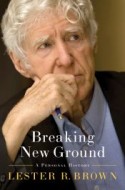 d that I write up a description of what such an organization would look like and send it to him to critique. It should be short—much like an informal grant proposal. Not long after, I sent him a six-page, double-spaced description of the proposed research institute and how it would function.
d that I write up a description of what such an organization would look like and send it to him to critique. It should be short—much like an informal grant proposal. Not long after, I sent him a six-page, double-spaced description of the proposed research institute and how it would function.
Bill responded with a few minor suggestions, and I then formally submitted a request for a $500,000 start-up grant. The grant was approved in June 1974.
At the heart of the staff for this new organization, which we called the Worldwatch Institute, were Erik Eckholm, my ODC research assistant, and Blondeen Duhaney (later Gravely), my administrative assistant. Blondeen was a vital force. In 1965, shortly after graduating from high school in North Carolina as valedictorian, she moved to Washington, DC, and began working in the secretary’s office at the U.S. Department of Agriculture. This is where I met her and we bonded immediately. Her vivacity and energetic work style endeared her to all who worked with her. Worldwatch took our working relationship to another level as she became the institute’s office manager—taking the lead in setting up the new organization—and later vice president for administration. We worked together in various capacities for twenty-nine years until she had to take medical retirement.
Newly recruited researchers included James Fallows, former editor of the Harvard Crimson; Kathleen Newland, a recent graduate of the Princeton master’s program in public affairs; and Denis Hayes, the coordinator of Earth Day in 1970. I convinced Bruce Stokes, whom I had met at the 1974 World Food Conference in Rome, to abandon his master’s program at the Columbia School of Journalism to head up our office of information.
Kathleen Courrier, a freelancer, was our part-time editor in the early years. When she took a full-time job, Linda Starke, who was on our outreach staff, became our editor. She went on to edit all our books and monographs. Shortly after she left in 1982 to begin her own freelance editing business, I enlisted her for the annual State of the World reports that we launched in 1984. With those reports under her belt, she was very much in demand to edit various international commission reports, in effect becoming a jet-set editor.
Felix Gorrell, who was comptroller of the Brookings Institution, advised us during the early years and also served as our treasurer. His assistance with investing and accounting was invaluable. Orville Freeman agreed to serve as chairman of the board. In late November 1974 we moved into our new quarters on the seventh floor of 1776 Massachusetts Avenue NW, just across the street from Brookings and the Overseas Development Council.
These early years were exciting. We were fashioning a new genre of research institute, one that did interdisciplinary research. This would not be a traditional economic or international affairs research institution, but rather one whose research centered on the environment broadly defined but that also included food, energy, population, water, and particularly the relationship between the environment and the economy. Our goal was to make our published material accessible to lay readers, publishable in scientific magazines, useful to the media, and indispensable to policymakers. We were caught up in the excitement of this challenge.
We also envisioned Worldwatch serving a worldwide constituency, a goal that only added to the complexity of the challenge. It is one thing to study global issues; it is another to reach a global popula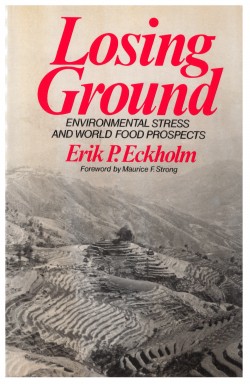 tion with the research results.
tion with the research results.
Erik wrote our first book, Losing Ground: Environmental Stress and World Food Prospects, which was released in early 1976. Losing Ground broadened the near-exclusive focus in the environmental community on industrial pollution in the developed world to include deforestation, overgrazing, soil erosion, desertification, and other environmental threats in the developing world.
While the book was at our publisher, Erik pulled material from it on the fast-growing demand for firewood, expanding it into the first in the monograph series. Entitled The Other Energy Crisis: Firewood, Worldwatch Paper 1 was published in September 1975. It was a huge media hit, generating a ton of stories, including a front-page story in The New York Times. The key to its success was the juxtaposition of the firewood crisis—affecting a third of humanity, but largely below the radar—with the oil crisis—of which the industrial countries were, at a time of quadrupling oil prices, keenly aware.
To read more of Lester Brown's life, purchase a copy of .
Best,
Reah Janise Kauffman
Monday, November 17, 2014
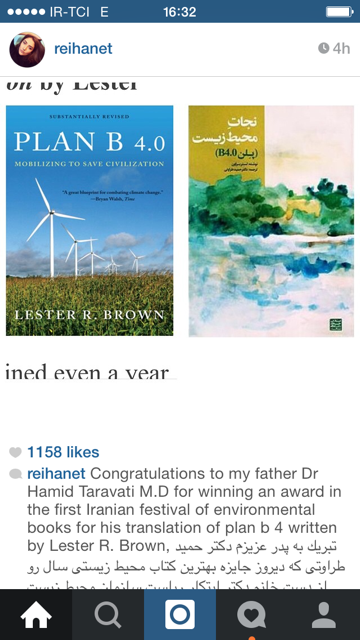 Today we learned that the Farsi edition of Plan B 4.0 was one of two books that received an award for the Best Environmental Book of the Year by the Iranian Environmental Protection Agency. Writing a book worthy of a prize is one thing, but translating a book is another. For that, we give credit to the translation team of Drs. Hamid Taravati and Farzaneh Bahar. It would not have happened without them.
Today we learned that the Farsi edition of Plan B 4.0 was one of two books that received an award for the Best Environmental Book of the Year by the Iranian Environmental Protection Agency. Writing a book worthy of a prize is one thing, but translating a book is another. For that, we give credit to the translation team of Drs. Hamid Taravati and Farzaneh Bahar. It would not have happened without them.
The ceremony was held Monday, November 16, at Iran’s EPA in Tehran and was the first Iranian festival of environmental books. The award was presented by Mrs. Ebtekar, the Vice President of Iran and President of the EPA. Our own Janet Larsen met Mrs. Ebtekar when she gave presentations in Iran some ten years ago.
Meanwhile, last month we learned that Breaking New Ground, Lester Brown’s memoir, had received the Santa Monica Public Library’s Green Prize for Sustainable Literature.
Cheers,
Reah Janise Kauffman
Wednesday, November 12, 2014
As part of our ongoing celebration of Lester Brown’s 80 years, here is an excerpt from his autobiography on his time at the Overseas Development Council (ODC).
"In 1968 when Richard Nixon was elected president, I had been heading the International Agricultural Development Service at the U.S. Department of Agriculture for two years. I knew that I did not want to work in a Nixon administration, so I resigned, leaving office a week before Nixon was inaugurated in January 1969. Much to my regret, Nixon dismantled the IADS. The reason given was that U.S. farmers did not want the USDA helping other countries to develop their agriculture, thus creating competition for them.
I walked away from the Nixon administration, but not from my life’s work. I had been approached by James P. Grant, a senior official at the Agency for International Development (AID) and someone I had worked with a few years earlier when he was the AID mission director in Turkey. Jim had been contacted by a group of U.S. opinion leaders who wanted to start a research organization to focus on third-world development and the U.S. role in it, and asked if he would head it.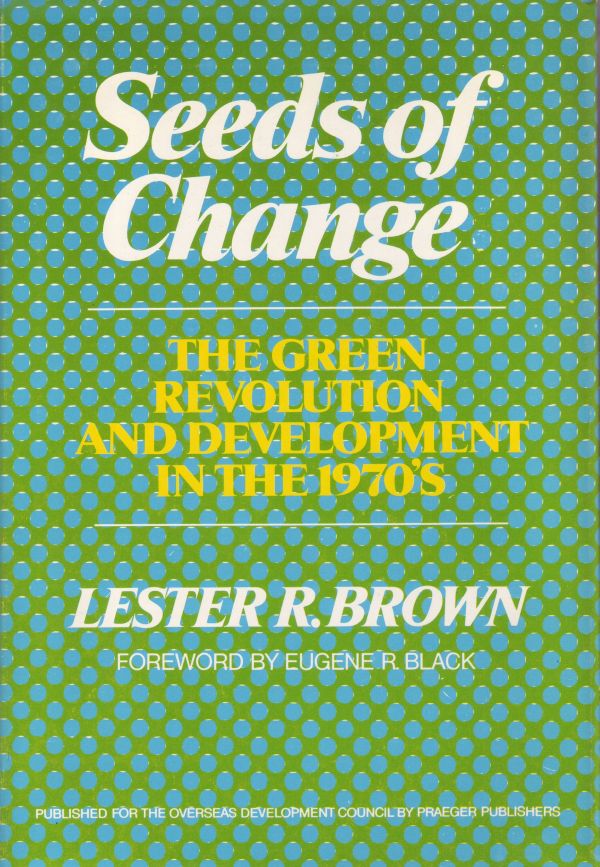
After the extraordinary success of the Marshall Plan and the enthusiasm it generated, U.S. public support for international development was waning. The group wanted to create an organization, the Overseas Development Council (ODC), to try to reverse this trend and restore U.S. support for international development efforts. These goals meshed nicely with my sense of what needed to be done.
Jim said he would take this position if I would join him. Jim offered me the position of vice president, but having just been in a management position I indicated a preference for being a senior fellow and concentrating on research. At this point there were many issues that I had been thinking about and wanting to write about. Jim understood. Within a few weeks, we signed a lease for space 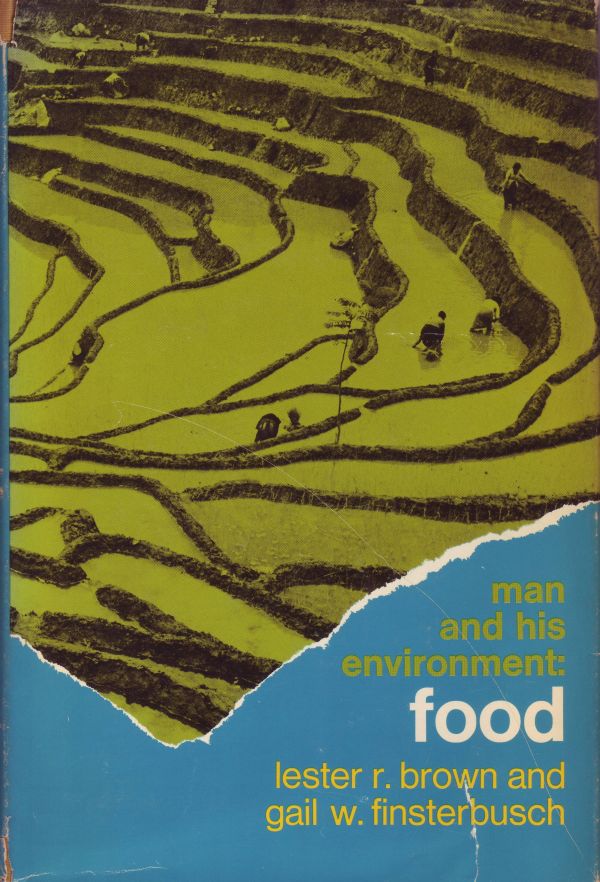 at 1717 Massachusetts Avenue NW in the heart of Washington’s Think Tank Row, and in January 1969 the ODC was born.
at 1717 Massachusetts Avenue NW in the heart of Washington’s Think Tank Row, and in January 1969 the ODC was born.
This period was a particularly yeasty time in U.S. history. It was in 1969, that the country made good on Kennedy’s bold 1961 promise that the United States would land a man on the moon during the decade. The photograph of the earth taken from outer space reminded us that political boundaries, not visible from space, are mere human constructs."
While at the ODC, Lester authored Seeds of Change (1970), Man and His Environment: Food (with Gail Finsterbusch) (1972), World Without Borders (1972), In the Human Interest (1974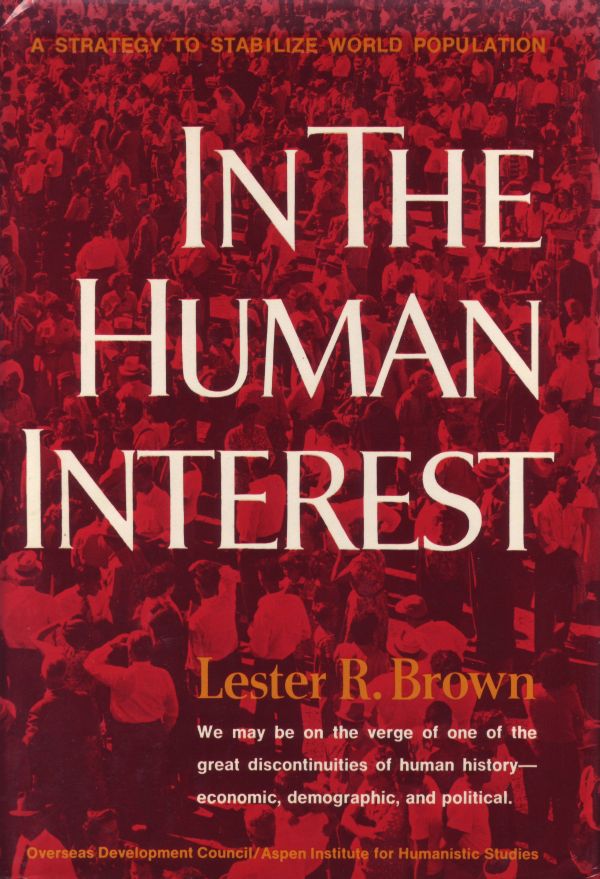 ) (for the World Population Conference), and By Bread Alone (with Erik Eckholm) (1974) (for the World Food Conference).
) (for the World Population Conference), and By Bread Alone (with Erik Eckholm) (1974) (for the World Food Conference).
The New Yorker described World Without Borders as “an encyclopedic, lucid assessment of some of the world’s persistent problems … and some carefully documented, highly plausible suggestions for solving them. [Brown] persuasively argues … that the day of the militaristic nation state is over, and that a unified global society is the only hope for survival.” This book was about globalization well before the concept was widely used.
The United Nations Population Fund had asked Lester to write a book for the World Population Conference. “They wanted a book that dealt with the many dimensions of the population issue, 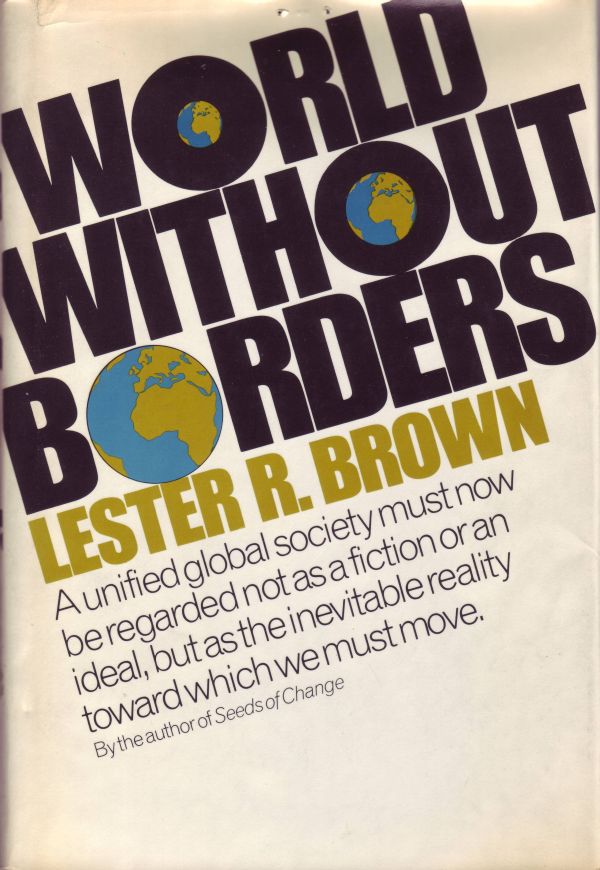 including not only food but other resources and the relationship between social conditions and fertility levels.” This became In the Human Interest.
including not only food but other resources and the relationship between social conditions and fertility levels.” This became In the Human Interest.
Because no other official document providing an overview of the food situation was delivered to the World Food Conference, By Bread Alone “became the leading source of information for anyone looking for an up-to-date account of the world food situation and future prospects for eradicating hunger.” By Bread Alone and In the Human Interest were written and published just months apart.
To read more of Lester Brown's life, purchase a copy of .
Best,
Reah Janise Kauffman
Tuesday, October 28, 2014
The Korean and Japanese editions of Lester Brown’s autobiography, Breaking New Ground, are available. The Korean edition by Doyosae, under the auspices of the Korea Green Fund and KFEM, was released several months ago—the first of the international editions!
The Japanese edition was recently released at IKARI’s 55th anniversary event where each of the 600 people in attendance received a copy. According to our publisher, Soki Oda of World Watch Japan, they were “delighted to receive copies and even more delighted to learn that it was Lester’s autobiography.” IKARI sponsored this edition.
Some of the panelists at the symposium, many of whom had shared a podium with Lester Brown in the past, said that “the book gave them renewed respect for him.”
Translation, especially to make it an enjoyable read, is never simple. The Japanese edition is especially readable and was done by volunteers, to whom we send our thanks: Hitomi Tsunekawa, Yuka Kinoshita, Hikaru Hamazaki, Tomomi Takaki, Yukari Kimura, Osamu Kusumoto, and Kunihiro Doi.
The photo (right) is of Masatsugu Kurosawa, head of IKARI, with the book. IKARI has long supported the publication of EPI’s books in Japan. In fact Toshishige and Masatsugu Kurosawa regularly distribute thousands of copies of each book to Japanese opinion leaders, including members of the Diet and corporate leaders.
And in case you missed it, the Hungarian edition is available electronically in PDF.
Other languages in which the autobiography is being released include Chinese, Dutch, Farsi, Italian, Spanish, and Swedish.
Cheers,
Reah Janise Kauffman
Wednesday, September 24, 2014
Twenty years ago, Lester Brown published an article in World Watch magazine titled “Who Will Feed China?” A year later, he followed with a book of the same name.
The article and book generated an enormous outcry from China and dozens of conferences, seminars, and studies, as he writes in his autobiography, Breaking New Ground.
"In 1994 I wrote an article for the September/October issue of World Watch magazine titled “Who Will Feed China?” The late August press conference releasing it generated only moderate coverage. But when the article was reprinted that weekend on the front of the Washington Post’s Outlook section with the title “How China Could Starve the World,” it unleashed a political firestorm in Beijing. …
The World Watch article attracted more attention than anything I have ever written. In addition to appearing in our magazine’s five language editions—English, Japanese, Chinese (Taiwan), German, and Italian—it also appeared in abridged form in many of the world’s leading newspapers, including the Washington Post, Los Angeles Times, and the International Herald Tribune. It was syndicated internationally by both the Los Angeles Times and The New York Times. Among the other major news organizations covering the analysis were the Associated Press and The Wall Street Journal, including the Asian edition. …
One of the most interesting responses was in Washington, DC, where the National Intelligence Council, the umbrella over all the U.S. intelligence agencies, analyzed the effect of China’s growing demand for grain on world agriculture and any security threats that it might pose. A panel of prominent researchers, led by Michael McElroy, then head of the Department of Earth and Planetary Sciences at Harvard, produced a first-rate study of several hundred pages. …
Meanwhile, within China, every few weeks another study was released attempting to demonstrate why my analysis was wrong. These critiques came from such disparate sources as a scientist from the Chinese Academy of Sciences, an official from the Ministry of Agriculture, and an independent academic scholar. Not long after, an enterprising Chinese publisher took a copy of the original World Watch magazine article and a collection of the critiques of it and published them in a book titled The Great Debate Between Lester Brown and China. …
Over time, China’s leaders came to both appreciate and acknowledge how Who Will Feed China? had helped change their thinking. A late 1998 issue of Feedstuffs, a weekly agribusiness newspaper, quotes Lu Mai, an agricultural economist and senior fellow at a government think tank in Beijing, as saying, “Brown seems to have been accorded guru status in high places. ‘He’s like the monk from outside who knows how to read the Bible.’” …
Lester proved prescient in his analysis. China is a leading importer of grain and it imports a staggering 60 percent of all soybeans entering world trade—and it looks like it will continue. The problem is not so much population growth, but China’s rising affluence, which is allowing its population to move up the food chain, consuming more grain-intensive livestock, poultry, and farmed fish.
Janet Larsen, EPI’s director of research, wrote last year on the Chinese purchase of Smithfield, the world’s leading pork producer. She has also written on how China’s meat consumption has grown to double that of the United States where meat consumption is falling.
Essentially, twenty years later, we are still wondering who will feed China?
Lester has written a number of articles over the last dozen years about China, which are available on Earth Policy Institute’s website. Below are some highlights.
Cheers,
Reah Janise Kauffman
P.S. For those of you in the DC area, on Tuesday, September 30, he will be speaking at the Wilson Center in Washington, DC, on “China’s Quest for Safe + Secure Food: Boon for U.S. Business?” RSVP here.
Can the World Feed China?
/plan_b_updates/2014/update121
China’s Rising Soybean Consumption Reshaping Western Agriculture
/data_highlights/2013/highlights34
Peak Water: What Happens When the Wells Go Dry?
/plan_b_updates/2013/update115
Learning from China: Why the Existing Economic Model Will Fail
/data_highlights/2011/highlights18
Iowa Eclipses Canada in Grain Production, Challenges China in Soybean Production
/data_highlights/2011/highlights16
Can the United States Feed China?*
/plan_b_updates/2011/update93
Learning from China: Why the Western Economic Model Will Not Work for the World
/plan_b_updates/2005/update46
China's Shrinking Grain Harvest: How its Growing Grain Imports Will Affect World Food Prices
/plan_b_updates/2004/update36
China Losing War with Advancing Deserts
/plan_b_updates/2003/update26
The 80th birthday celebration for Lester Brown continues!
There were a number of terrific people who talked about working with Lester. In this post, we are including videos from people who knew Lester as a farmer and who worked through the academic and non-profit sectors.
Angela Kendall was a member of the International Farm Youth Exchange group that sailed from New York to India in the fall of 1956.
Larry Suydam was an agricultural student with Lester at Rutgers. Sometimes he would spend his weekends helping Lester work his tomato farm.
Mohan K. Wali is Professor Emeritus in the school of environment and natural resources (SENR) at Ohio State University (OSU) in Columbus. At OSU since 1990, he served as director both of SENR, and of the OSU’s multi-college environmental science graduate program.
Felix Kramer is a writer and serial entrepreneur working on cleantech. He founded the nonprofit California Cars Initiative (CalCars.org) in 2002 to bring plug-in hybrid cars like the Chevy Volt to market.
Bill Ryerson is president of the Population Media Center and travels around the world. Since 2008, he has also served as Chair and CEO of Population Institute in Washington, DC, which works in partnership with Population Media Center.
Tom Weis founded and heads Climate Crisis Solutions. In 2010, he completed a 2,500-mile "rocket trike" ride from Boulder, CO to Washington, DC, calling for a goal of 100% renewable electricity for the U.S. by 2020.
Always more to share, so stay tuned!
Reah Janise Kauffman
P.S. Our thanks to Moser Media for the great video work!
